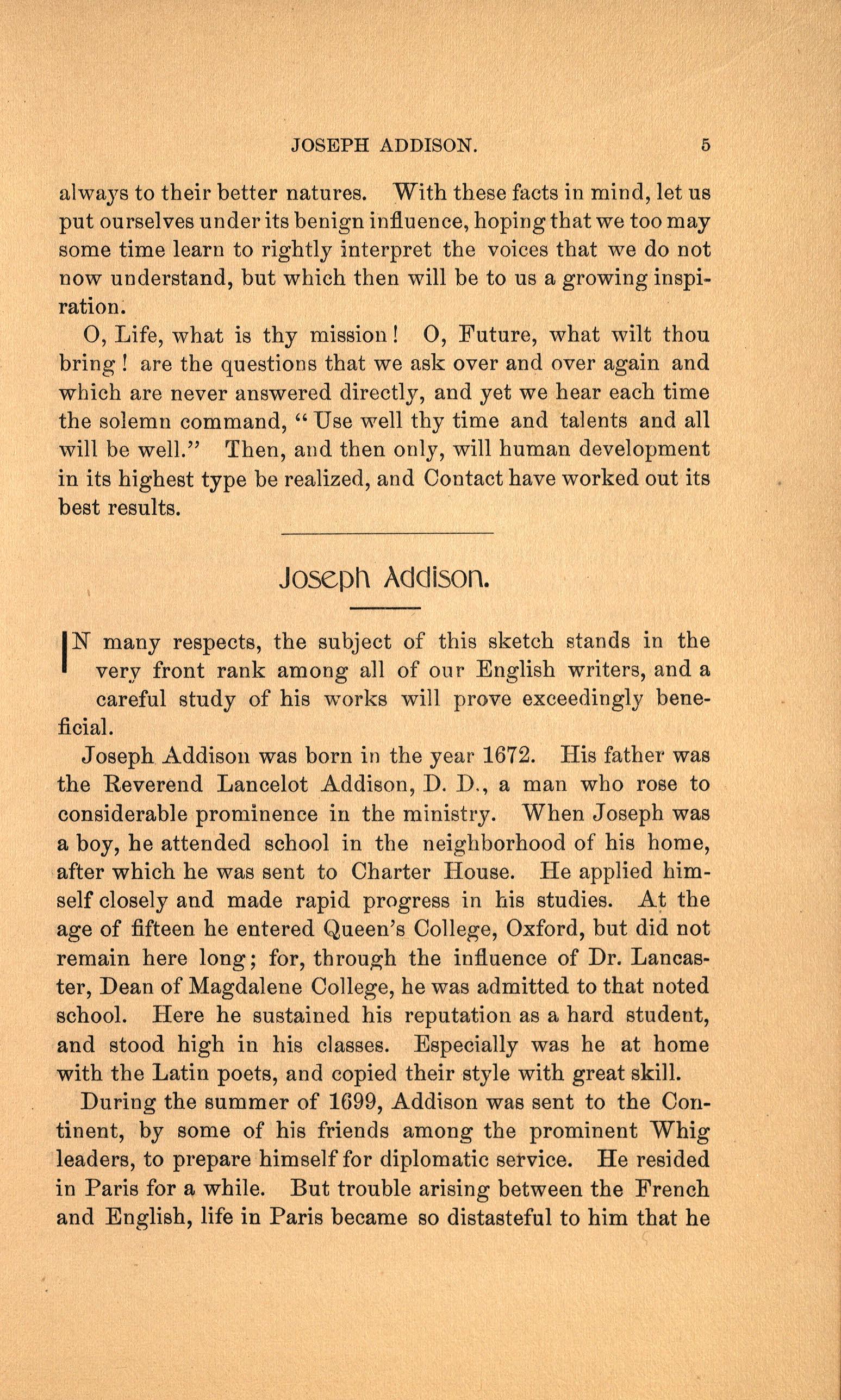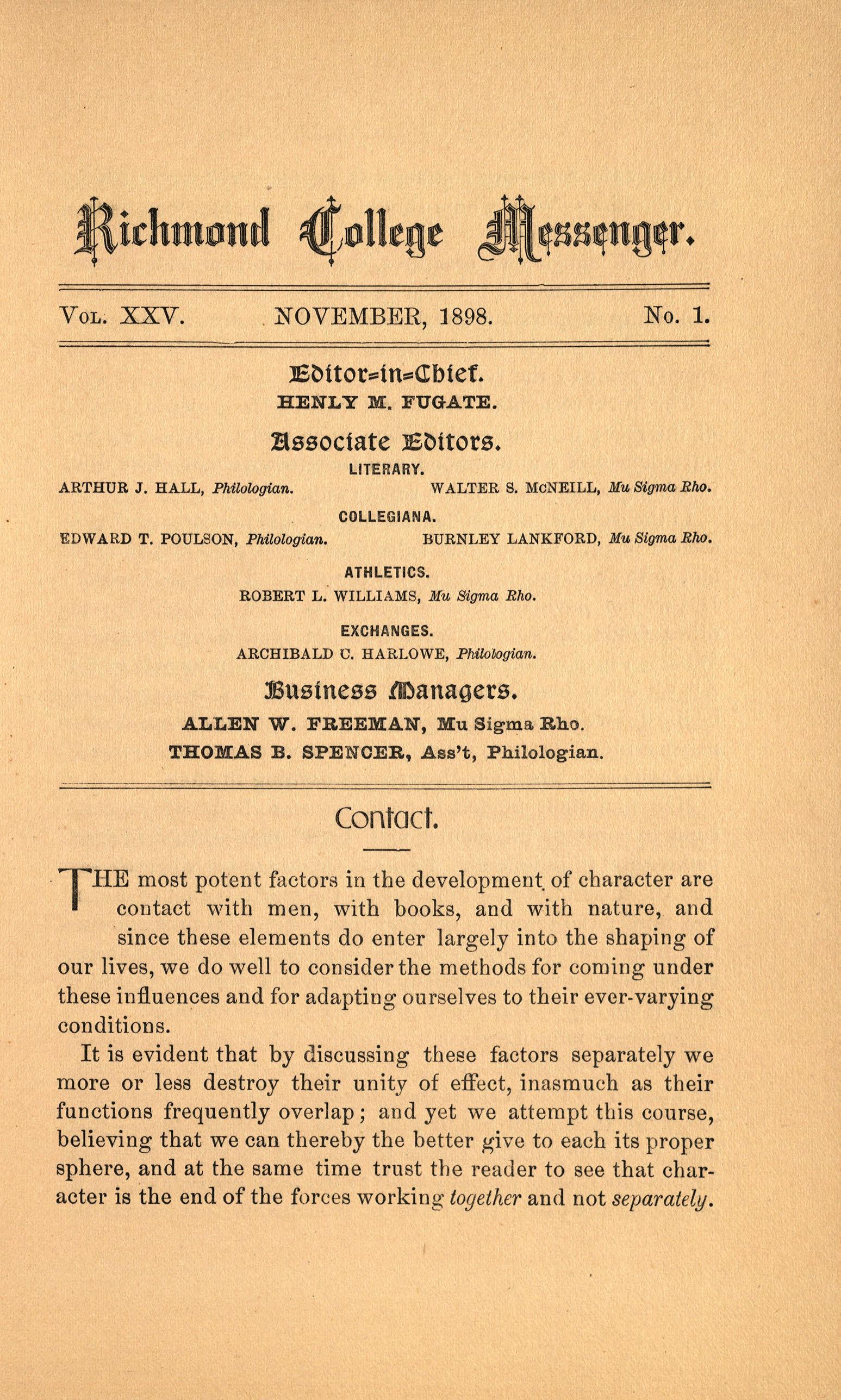
3 minute read
Joseph Addison
JOSEPH ADDISON.
5
always to their better natures. With these facts in mind, let us put ourselves under its benign influence, hoping that we too may some time learn to rightly interpret the voices that we do not now understand, but which then will be to us a growing inspiration: 0, Life, what is thy mission! 0, Future, what wilt thou bring ! are the questions that we ask over and over again and which are never answered directly, and yet we hear each time the solemn command, "Use well thy time and talents and all will be well." Then, and then only, will human development in its highest type be realized, and Contact have worked out its best results.
Joseph Addison.
IN many respects, the subject of this sketch stands in the ver_y front rank among all of our English writers, and a careful study of his works will prove exceedingly beneficial.
Joseph Addison was born in the year 1672. His father was the Reverend Lancelot Addison, D. D., a man who rose to considerable prominence in the ministry. When Joseph was a boy, he attended school in the neighborhood of bis home, after which he was sent to Charter House. He applied himself closely and made rapid progress in his studies. A~ the age of fifteen he entered Queen's College, Oxford, but did not remain here long; for, through the influence of Dr. Lancaster, Dean of Magdalene College, be was admitted to that noted school. Here he sustained his reputation as a hard student, and stood high in his classes. Especially was be at home with the Latin poets, and copied their style with great skill.
During the summer of 1699, Addi.son was sent to the Continent, by some of his friends among the prominent Whig leaders, to prepare himself for diplomatic service. He resided in Paris for a while. But trouble arising between the French and English, life in Paris became so distasteful to him that he
RICHMOND COLLEGE MESSENGER.

soon embarked for Marseilles, and from there he proceeded to Italy. Among the most prominent cities he visited are Genoa, Milan, Venice, Rome, Naples, and Florence. In these places he viewed the classic architecture, the magnificent cathedrals, the art galleries, the sculptures, and the other various things of interest to be found in such world-renowned cities. Just as he had :finished his diplomatic education, and was in a position to be able to serve his country, Anne came to the throne, and the Whigs were dismissed from the Cabinet and Tories appointed to succeed them. Addison, being a staunch Whig, had, of course, for the present, to abandon all hope of political preferment. He returned to England in 1703.
The Campaign, a poem on the battle of Blenheim, appeared during the winter of 1704, and elicited the highest praise, even from his political enemies.
In the general election of 1708, the Whigs were everywhere victorious. Addison was elected to represent Malmsbury in the House of Commons. Although gifted with his pen, he was totally unable to make a speech, and sat silent during all the sessions of the House. It seems strange to us that one with no oratorical powers whatever could have attained to the high offices Addison held, for he became, successively, UnderSecretary of State, Chief Secretary of Ireland, and Secretary of State within · nine years from the date of his election to Parliament. This is as high as Chatham or Fox, with all their eloquence, ever reached.
During Addison's stay in Ireland as Secretary, Steele begun the publication of his tri-weekly journal, known as the Tatler, Addison was a regular contributor to this journal, and was, indeed, as Steele himself says, the very life of the paper. In like manner, to Addison's contributions are due the popularity and the real worth of the Spectator, a daily jouroal published by Steele a little later. It was in these publications that Addison :first manifested the extent and variety of his powers, and among these we may :find some of his best and most popular writings.










